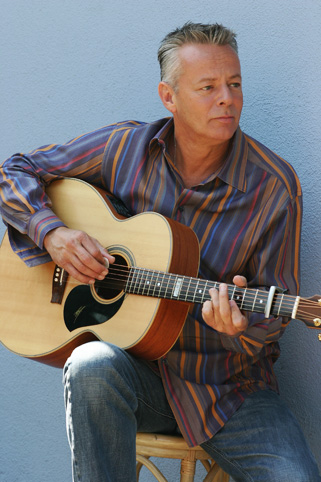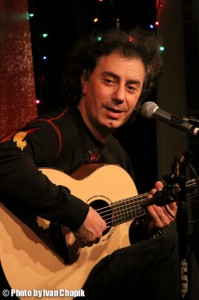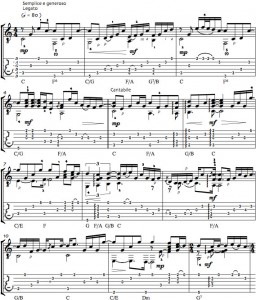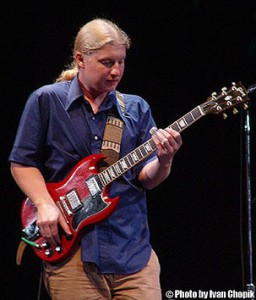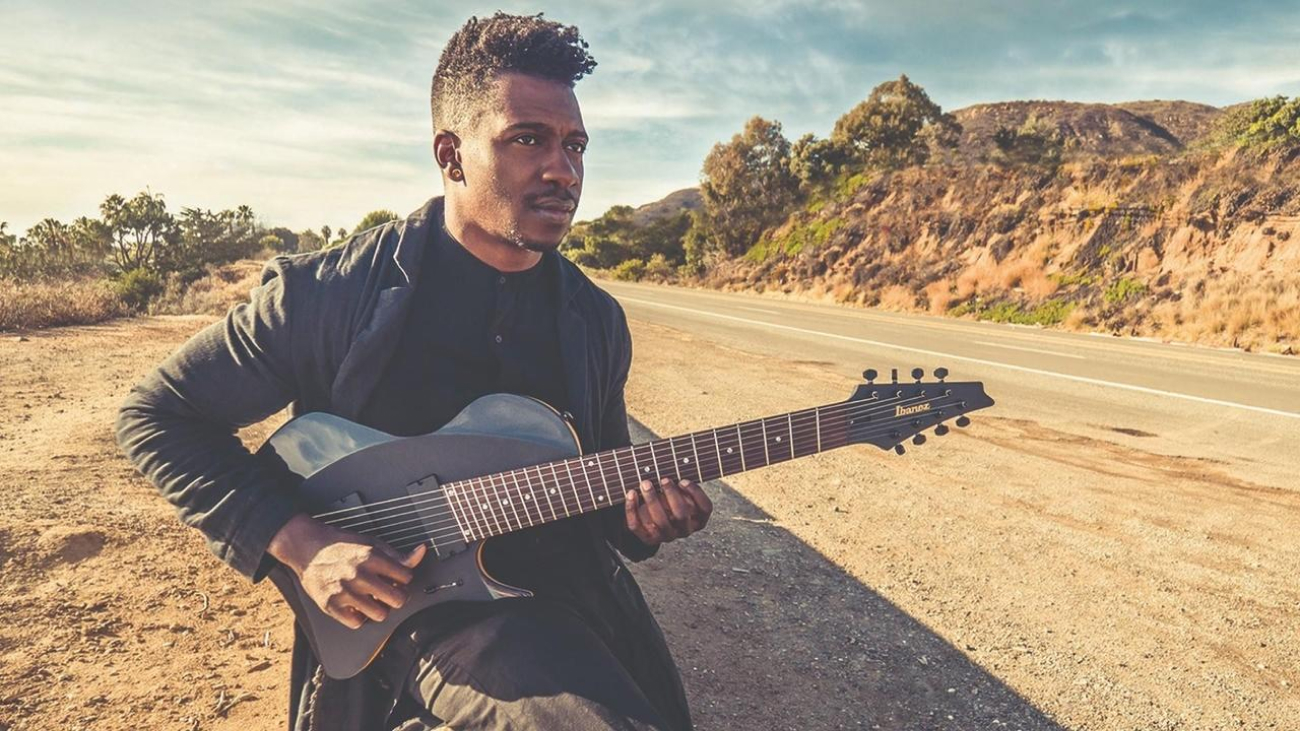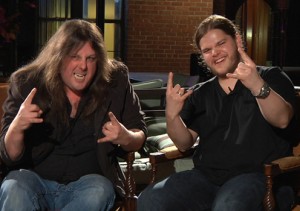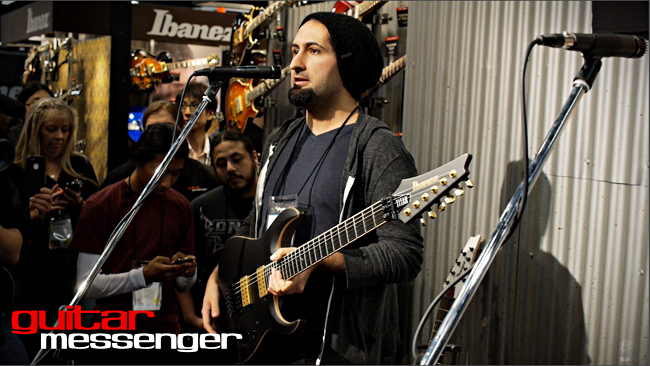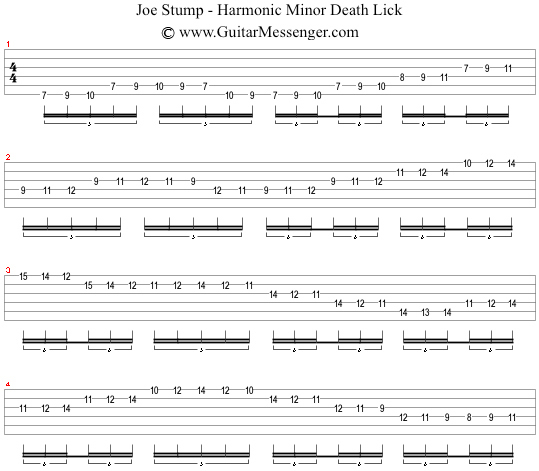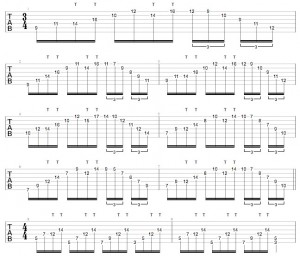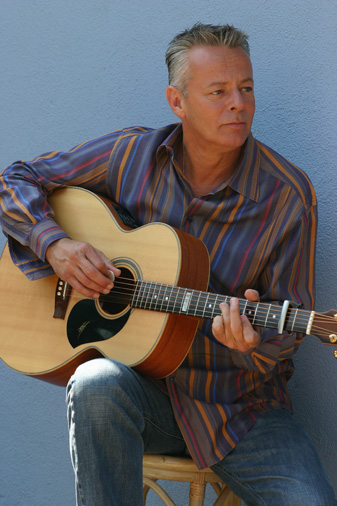 Australian virtuoso Tommy Emmanuel is going on five decades of professional guitar playing. At an age when most of us were occupied with learning our alphabets and the intricacies of counting to twenty, Tommy was falling under the spell of Chet Atkins and cooking up his own brew of musical magic.
Australian virtuoso Tommy Emmanuel is going on five decades of professional guitar playing. At an age when most of us were occupied with learning our alphabets and the intricacies of counting to twenty, Tommy was falling under the spell of Chet Atkins and cooking up his own brew of musical magic.
After honing his chops as a sideman throughout the seventies and eighties, Tommy embarked on a solo career. He followed the trails of Doc Watson, Merle Travis, and Leo Kottke and carried the torch of acoustic Americana back Down Under and then around the world.
On his own, Tommy has recorded over twenty albums, and in 1997 his first point of inspiration returned full circle as he recorded the album The Day the Finger Pickers Took Over the World with his hero, Chet Atkins. The expansive 24-track Little By Little is his most recent and by far most comprehensive release – from the pensive drones of ‘Tears For Jerusalem’ to the Beatles-inspired ‘Halfway Home,’ no stone of Tommy’s musical world remains unturned.
In the midst of hitting the road hard in support of the new record, Tommy was kind enough to share with us everything that went into the new album, what it takes to go from the stage to the studio and back, and the secrets to the fine art of kite flying.
LD: Congratulations on Little By Little. What were your goals going into the studio? Did you have any idea of the sheer breadth of material you were going for?
TE: I started recording this album because I had some songs and I wanted to get going with the album. I recorded ¾ of the album and then lived with it for a while, then came back a year later and recorded everything again. It’s the first time that I’ve ever done anything like that where I’ve re-recorded stuff. I also wanted to record some duets with John Knowles and Doyle Dykes and Rick Price, because those songs and those performances were important to me. On my previous recordings I never had the chance to just play melody and had no backing, so this was a chance to do something different for my fans, for my listeners and for myself.
LD: Little by Little contains several live favorites that have only now been recorded in the studio. How much of your material grows from a live setting into the studio?
TE: Normally I write songs and play them on the road for months before I ever go in and record them. That way, I have honed them and tried to find the best way of playing the song, the best tempo, and the best feeling by performing it in front of an audience. Some of the songs, like ‘Halfway Home,’ ‘Tears for Jerusalem’ and ‘The Trails’ were brand new when I went into the studio.
LD: In the past, you’ve had some trouble seeing your records released outside of Australia. Thankfully, Little By Little is being released by international heavyweight Favored Nations. You’re a legend in Australia, but do you feel the markets for your style of music are different between home and the Americas?
TE: Everything since Endless Road in 2004 was released by Favored Nations concurrently with companies in Australia. I think it’s hard to get good distribution everywhere in the world as I’m not a normal pop or rock act. I have to find the right people who will be bothered to get my music out there, and that’s not easy.
LD: While your guitar remains in the foreground on Little By Little, supporting instruments, from percussion to strings often seep into the mix. How do you decide when one of your solo pieces needs another voice?
TE: Let me say that every sound on my records is carefully put there. Certain songs really lend themselves to string arrangement or percussion accompaniment. Some of my songs, like ‘Halfway Home’ for instance, need nothing – they just need me to try to play them well. I always remain objective with my music. I never try to force any ideas that are not right for the song, ever. I always try to do the best job and take the most honest approach for the song.
LD: Being familiar with both electric and acoustic guitar, how does your approach to composing and performance change when you move from one to the other?
TE: I haven’t composed for electric guitar for many years, but when I did I would often use the method of writing what I considered a good chord progression, and then write a good melody over the top of it. With the acoustic I always approach it like I’m writing a song for a singer, and a band. I never approach songwriting as just a guitar player, I always try to think like a singer.
LD: Do you often stray from standard EADGBE and dabble with open or alternate tunings?
TE: I’ve only written songs for alternative tunings a couple of times. The alternate tuning that I use the most is DGDGBE or G6th with a D bass. I got this tuning from Chet Atkins and it’s a lovely sounding tuning. I do not play anything in DADGAD, or BAGDAD, or BADDAD. I’m having enough trouble with normal tuning.
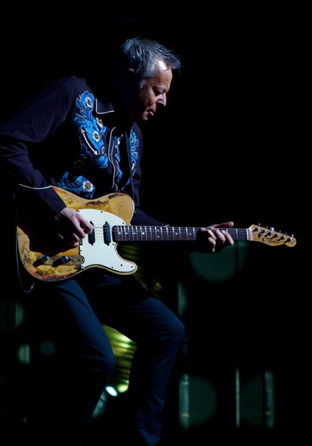
LD: How does improvisation work into your process of composition and performance?
TE: Improvisation is a never-ending source of fun for me on stage and I try to ‘fly my kite’ as much as possible when I’m out there. However, as a performer of songs, I don’t improvise in every song, because not every song needs it. So when I want to improvise, I play a song like ‘Guitar Boogie’ where I can do what I want.
LD: You often play your guitar as if it were a hand drum. How did you develop your unique percussive style?
TE: Out of necessity. One night I broke two strings on my old Takamine and I really had the crowd going so I started banging on my guitar to keep them going, and it wasn’t a bad sound. Once I got my Maton guitars with a mic inside, that opened up a whole new world to me as a percussionist because the guitar literally became a drum in my hands.
Then one day I got the idea to play it with a plastic brush and it really sounded like a shaker, so I was able to make real percussion sounds. Also, I play a drum solo on my guitar because it’s fun and entertaining for the audience, and I like to do things to surprise the audience.
LD: You discovered the original fingerpicking guru Chet Atkins at a very early age. What first struck you about his music?
TE: When I first heard Chet it was the best tone and best playing I’d heard to date. I was also stunned by the fact that he was playing everything at once. It was such a unique sound. I was so inspired that I spent more hours playing than sleeping or eating trying to do what he was doing.
I’ll never forget the feeling of performing ‘Windy And Warm’ and ‘Nine Pound Hammer’ in front of an audience for the first time. You’ve gotta remember that in the early 60’s there was nobody in Australia playing anything like that on stage, so when I played a piece just on my own, people were amazed and looking for the other player.
LD: Were there any challenges to overcome when you recorded a duo album with Chet (1997’s The Day Finger Pickers Took Over The World)?
TE: I think Chet and I just wanted to get the best songs and best performances that we could, and the hardest part was to try to get him to do the best he could because of his illness. Considering Chet was recovering from lifesaving surgery, I had to give him time to record his parts when he felt well enough. However, some of the duets like ‘Waltzing Matilda’ and ‘Smokey Mountain Lullaby’ were recorded live together and only played once.
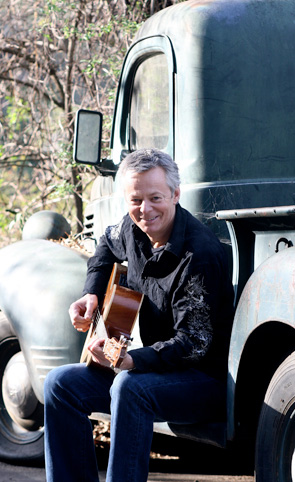
LD: Your guitar sat comfortably in the middle of the lushly orchestrated ballad ‘Much Too Soon’ from Michael Jackson’s first posthumous release. How did that collaboration come about?
TE: Keb’ Mo’ recommended me to the producers for the track. I was extremely honored to be asked and hope that Michael likes the track.
LD: You’ve played with (among many others) Eric Clapton, Doc Watson, John Denver, Les Paul and, on your most recent outing, bassist Victor Wooten. If you could work with any musician today, who would it be?
TE: I love working with Ricky Skaggs. Also, Larry Carlton and I will be working together in the future.
LD: Who is a current musical artist that your fans would be surprised that you listen to?
TE: Pink and Christina Aguilera. Probably my favorite of the younger people would be John Mayer.
LD: You’re notorious for eschewing defined setlists at your shows. How do you steer a concert from beginning to end?
TE: With experience. I know what works and all my instincts tell me what to play next. That’s why God gave us instincts. We’re supposed to use them.
LD: As agile and impressive as your live playing is, you are also an incredible entertainer and presence on the stage – one that demands to not just be heard but seen. What’s your philosophy for performance?
TE: I will do anything I can to entertain people, to give them a good time. I use all my skills, all my wit, and all my experience to try to do a good job when I walk on stage. My priority is the audience and that the night goes well. I play and perform totally in the moment.



